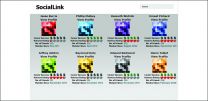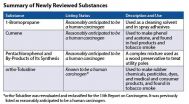Diet affects mix of intestinal bacteria and the risk of inflammatory bone disease
St. Jude Children's Research Hospital study finds diet may influence susceptibility to autoinflammatory disease in at-risk individuals by favoring intestinal bacteria that fuel or dampen inflammation
2014-10-02
(Press-News.org) (MEMPHIS, Tenn. – October 2, 2014) Diet-induced changes in the gut's bacterial ecosystem can alter susceptibility to an autoinflammatory bone disease by modifying the immune response, St. Jude Children's Research Hospital scientists reported. The findings appeared September 28 as an advanced online publication of the scientific journal Nature.
The research provides insight into how the thousands of bacteria and other microorganisms that live in the intestines affect health. The microbes make up the intestinal microbiome, a diverse evolving ecosystem that aids digestion and helps to educate the immune cells that guard against infection. Growing evidence suggests that changes in the microbiome composition may contribute to development of diseases ranging from cancer to chronic inflammatory disorders such as multiple sclerosis. The mechanisms involved, however, were poorly understood.
"These results are exciting because they help to explain how environmental factors like diet can influence susceptibility to autoinflammatory diseases," said the study's corresponding author Thirumala-Devi Kanneganti, Ph.D., a member of the St. Jude Department of Immunology. "While multiple lines of evidence have suggested that diet can impact human disease, the scientific mechanism involved was a mystery. Our results demonstrate that diet can influence immune-mediated disorders by shaping the composition of the gut microbiome, which our findings suggest play a role in immune regulation."
The study was done in a mouse model of the devastating inflammatory childhood bone disorder chronic recurrent multifocal osteomyelitis (CRMO). The mice carry a mutation in the Pstpip2 gene that leads to osteomyelitis early in life.
Researchers showed that changing the nutritional composition of the animals' diets led to marked increases and decreases of certain intestinal bacteria. Affected bacteria included Prevotella, which have been implicated in causing osteomyelitis, arthritis, periodontal disease and other inflammatory disorders in humans.
A diet that limited intestinal Prevotella growth also protected the mutant mice from developing osteomyelitis. The same diet was associated with reduced production of the immune molecule interleukin-1 beta; (IL-1 beta) that promotes inflammation. Earlier work from Kanneganti's laboratory demonstrated that IL-1 beta fueled osteomyelitis in the mutant mice. In this study, researchers reported that dietary changes impacted the supply of IL-1 beta in immune cells called neutrophils.
To confirm the connection between the intestinal microbiome and osteomyelitis, researchers treated mice that were fed the disease-promoting diet with a cocktail of broad-spectrum antibiotics. Treatment was followed by a reduction in Prevotella as well as intestinal levels of Il-1 beta. In addition, fewer mice developed osteomyelitis.
In a series of probiotic experiments, investigators demonstrated that transplanting the intestinal microbiome from healthy mice protected the at-risk, mutant mice from osteomyelitis. Probiotics are bacteria and other microorganisms with a demonstrated health benefit. "The results suggest probiotics might provide a more targeted method for suppressing production of IL-1 beta and protecting against autoinflammatory diseases," said first author John Lukens, Ph.D., a St. Jude postdoctoral fellow.
The research also provided key details about IL-1 beta production and regulation in neutrophils, which are part of the body's first line of defense. Investigators identified the two enzymes capable of converting the immune molecule from its inactive form to the pro-inflammatory IL-1 beta. The enzymes are caspases 1 and 8. Deleting both enzymes led to a dramatic decline in IL-1 beta in the susceptible mice and protected the animals from osteomyelitis.
INFORMATION:
The study's other authors are Prajwal Gurung, Peter Vogel, Gordon Johnson, Robert Carter, Daniel McGoldrick, Srinivasa Rao Bandi and Christopher Calabrese, all of St. Jude; Lieselotte Vande Walle and Mohamed Lamkanfi, of Ghent University, Ghent, Belgium.
The research was funded in part by a grant (AR056296) from the National Institute of Arthritis and Musculoskeletal and Skin Diseases, part of the National Institutes of Health (NIH); a grant (CA163507) from the National Cancer Institute, part of the NIH; a grant (AI101935) from the National Institute of Allergy and Infectious Diseases, part of the NIH; and ALSAC.
St. Jude Media Relations Contacts
Carrie Strehlau
desk (901) 595-2295
cell (901) 297-9875
carrie.strehlau@stjude.org
Summer Freeman
desk (901) 595-3061
cell (901) 297-9861
summer.freeman@stjude.org
St. Jude Children's Research Hospital
St. Jude Children's Research Hospital is leading the way the world understands, treats and cures childhood cancer and other life-threatening diseases. It is the only National Cancer Institute-designated Comprehensive Cancer Center devoted solely to children. Treatments developed at St. Jude have helped push the overall childhood cancer survival rate from 20 percent to 80 percent since the hospital opened more than 50 years ago. St. Jude is working to increase the overall survival rate for childhood cancer to 90 percent in the next decade. St. Jude freely shares the breakthroughs it makes, and every child saved at St. Jude means doctors and scientists worldwide can use that knowledge to save thousands more children. Families never receive a bill from St. Jude for treatment, travel, housing and food—because all a family should worry about is helping their child live. To learn more, visit stjude.org or follow St. Jude at @stjuderesearch.
ELSE PRESS RELEASES FROM THIS DATE:
2014-10-02
COLUMBUS, Ohio – When people are in a bad mood, they are more likely to actively search social networking sites like Facebook to find friends who are doing even worse than they are, a new study suggests.
Researchers found that, in general, people use social media to connect with people who are posting positive and success-oriented updates.
"But when people are in a negative mood, they start to show more interest in the less attractive, less successful people on their social media sites," said Silvia Knobloch-Westerwick, co-author of the study and professor of communication ...
2014-10-02
Building on the poverty relief success achieved through self-sustaining high-tech "smart villages," Malaysian innovators have created blueprints for an urban counterpart that combines affordable homes, food security and sustainable jobs, aiming to solve the growing global problem of squalid city slums.
Like the 50-acre smart village sites, the 5-acre urban version provides affordable accommodation with educational and community facilities and incorporates innovative employment opportunities and food security through aquaculture and state-of-the-art water-efficient greenhouse-based ...
2014-10-02
The majority of wines are produced from around 20 different types of grape, all of which have their own typical aroma. This is due to the terpenes, a diverse category of chemical substances including cholesterol and estrogen. Scientists from Technische Universität München (TUM), the Hochschule Geisenheim and the Universität Bonn have now identified two enzymes that determine the terpene content – and thus the aroma intensity – of grapes. The findings could play an important role in the future development of grape varieties.
From Chardonnay to Sauvignon, Dornfelder to ...
2014-10-02
October 2, 2014 – A parent coaching intervention brings meaningful benefits for preschool-aged children with autism-spectrum disorders (ASD), according to a clinical trial in the October Journal of Developmental & Behavioral Pediatrics, the official journal of the Society for Developmental and Behavioral Pediatrics. The journal is published by Lippincott Williams & Wilkins, a part of Wolters Kluwer Health.
The "Play and Language for Autistic Youngsters" (PLAY) Project approach yields improved parent-child interactions, along with other benefits for children with ASD ...
2014-10-02
Have you ever ordered more food at a restaurant than you intended? There are elements of dining rooms that actually prime you to eat more food. One such element is the weight of those dining with or near you. This new Cornell University study found that the body type of your dining partner, or that of those dining nearby, may actually influence how much you serve yourself and how much you eat!
The study investigated the impact the presence of an overweight diner on healthy and unhealthy food choices and found you are more likely to serve and eat more unhealthy foods ...
2014-10-02
This news release is available in German, Spanish, French and Japanese.
High rates of anxiety and depression amongst patients with irritable bowel syndrome (IBS) have led many researchers to believe there could be a causal relationship between psychological factors and IBS symptoms. Now, scientists in Germany have found clear evidence that patients with IBS process pain signals from the gut abnormally, and that disturbed brain responses to pain are particularly pronounced in patients with more depression symptoms.1
At the 22nd United European Gastroenterology ...
2014-10-02
Four substances have been added in the U.S. Department of Health and Human Services 13th Report on Carcinogens, a science-based document that identifies chemical, biological, and physical agents that are considered cancer hazards for people living in the United States. The new report includes 243 listings.
Ortho-toluidine, used to make rubber chemicals, pesticides, and dyes, has been reevaluated and is now listed as a known human carcinogen. Three substances have been added as reasonably anticipated to be human carcinogens. These include 1-bromopropane, used as a cleaning ...
2014-10-02
When asked to describe a forest or a meadow, most people would probably begin with the plants, the species diversity, or the color of the foliage. They probably wouldn't pay much attention to the animals living in the soil.
But a new Yale-led study shows the critical importance of earthworms, beetles, and other tiny creatures to the structure of grasslands and the valuable ecosystem services they provide.
During a 3-year study, researchers found that removing these small animals from the soil of a replicated Scottish sheep meadow altered the plant species that grew ...
2014-10-02
LOS ANGELES – (Oct. 2, 2014) – Surveying patients with traumatic brain injuries, a group of Los Angeles Biomedical Research Institute (LA BioMed) researchers reported today that they found those who tested positive for THC, the active ingredient in marijuana, were more likely to survive than those who tested negative for the illicit substance.
The findings, published in the October edition of The American Surgeon, suggest THC, or tetrahydrocannabinol, may help protect the brain in cases of traumatic brain injury, the researchers said. The study included 446 patients who ...
2014-10-02
New Rochelle, NY, October 2, 2014–Women who have a history of violent sexual abuse may suffer emotional distress during a routine pelvic examination. Healthcare providers would benefit from greater awareness of symptoms predictive of examination-related distress in this patient population, according to a study published in Violence and Gender, a new peer-reviewed journal from Mary Ann Liebert, Inc., publishers. The article is available free on the Violence and Gender website at http://online.liebertpub.com/doi/full/10.1089/vio.2014.0016 until November 2, 2014.
In the ...
LAST 30 PRESS RELEASES:
[Press-News.org] Diet affects mix of intestinal bacteria and the risk of inflammatory bone disease
St. Jude Children's Research Hospital study finds diet may influence susceptibility to autoinflammatory disease in at-risk individuals by favoring intestinal bacteria that fuel or dampen inflammation





